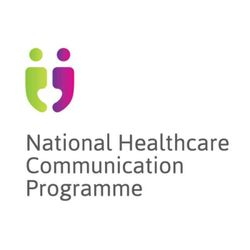Latest episode

4. Dr Jannicke Mellin-Olsen
18:52||Season 1, Ep. 4Welcome to the Making Conversations Easier podcast. In this episode, our hosts Professor Peter Gillen and Wini Ryan are joined by Dr Jannicke Mellin-Olsen to discuss an interesting initiative to improve communication with patients. Jannicke is a Past President of the World Federation of Societies of Anaesthesiologists, A former president of the European Board of Anaesthesiology among many other prestigious appointments. Her main professional interests are patient safety, particularly culture, communication and human factors in addition to education and health politics including workforce planning. Practising at Baerum Hospital, Oslo, in Norway. Jannicke was the recipient from the King of Norway appointed her as Knight 1st Class of the Order of St.Olav”, the highest civilian honour currently conferred by Norway, due to her services in healthcare.Tune in while she shares her insights on good communication skills for improving the patient experience and healthcare outcomes.Key TakeawaysSitting during the patient encounter improves provider-patient communication and the patient experience of care.Patients commonly perceive that healthcare staff have spent more time at their bedside when staff sit rather than standSitting down and making eye contact with the patient can help staff to demonstrate empathy and can encourage the patient to share their worries and concernsPatients express a better understanding of their condition when healthcare staff sit at the bedside
More episodes
View all episodes

3. Michael West
55:42||Season 1, Ep. 3Welcome to the Making Conversations Easier podcast. In this episode, our hosts Professor Peter Gillen and Wini Ryan are joined by Professor Michael West to discuss Team-based Working. Michael is a Senior Visiting Fellow at The King’s Fund, London, Professor of Organisational Psychology at Lancaster University, Visiting Professor at University College, Dublin, and Emeritus Professor at Aston University. He has authored, edited and co-edited 20 books and has published more than 200 articles on teamwork, innovation, leadership, and culture, particularly in healthcare. His latest book, Compassionate Leadership: Sustaining Wisdom, Humanity and Presence in Health and Social Care was published to critical acclaim in July 2021. Michael was appointed a CBE in the Queen’s Birthday Honours List in 2020 for services to compassion and innovation in healthcare. Michael is on Twitter as @WestM61 and can be contacted at m.a.west@lancaster.ac.uk. Tune in while he shares his insights on team-based working and how we might work together in healthcare to create team cultures of care and compassion.Key Takeaways:Within the healthcare services, caring for the patient depends on the various activities of many different multidisciplinary teams. For those teams to achieve co-ordinated, high quality, safe care, they must work collaboratively with patients, their families and carers and with each other. The word ‘Team’ describes groups of employees which have these characteristics:They share objectivesThey have the necessary authority, autonomy and resources to achieve these objectivesThey have to work closely and interdependently to achieve these objectivesThey have well-defined and unique rolesThey meet regularly to review their performance and how it can be improved.The 4 key principles of team-based working are Safety and Trust, Common Purpose, Effective Communication and Collective Leadership.Flattening the hierarchy is vital for an open, blame-free culture where staff are valued, seen as equals and are supported to voice their opinions and concerns. It is team working that ultimately determines whether or not patients receive high quality, continually improving and compassionate care. And so the leadership of healthcare organisations must ensure high quality and continually improving team- based working.To deliver compassionate care, staff first need to practice and develop self-compassion. This involves paying attention, understanding their own life situations, practising empathy towards themselves, and compassionately taking wise, kind action to help themselves.
2. Cathy MacDonald
35:18||Season 1, Ep. 2Welcome to the Making Conversations Easier podcast. In this episode, our hosts Professor Peter Gillen and Wini Ryan are joined by Cathy MacDonald to discuss Core Emotional Concerns. Cathy joined Tayside Police in 1983 and for 32 years proudly served as an operational officer throughout Scotland. A significant part of her career was dedicated to the world of hostage and crisis negotiation and Cathy was involved in all aspects of negotiation work deploying to kidnaps, extortion, sieges, protests, suicide interventions and any incident that required focused and precise communication. She advised Commanders in relation to negotiation tactics and was responsible for training negotiators both nationally and internationally. On completion of her police career in 2015, Cathy created The Art of Communication and now runs her own business sharing powerful and effective communication skills to individuals, teams and businesses. Cathy is on Twitter and Instagram as @CathyAofC, on Facebook (Art of Communication) and her website is www.artofcommunication.co.uk. Tune in while she shares her insights on core emotional concerns and how we might use these in healthcare.Key Takeaways:Core Emotional Concerns are fundamental, universal, human motives that drive behaviour, cognition, and emotion. Supporting each other’s core concerns leads to positive emotions, which can foster and enhance relationships, build rapport and encourage effective communication. Fisher and Shapiro (two psychologists who worked on the Harvard International Negotiation Project) tell us we all have five core concerns: appreciation, affiliation, autonomy, status, and role. Individuals and groups across all cultures need to feel appreciated by others, to affiliate with others, to have autonomy, to have others recognise their status, and to have a meaningful role. When emotion changes, Core Emotional Concerns are at work. The quickest and most effective way to support someone’s core concerns is to listen to understand.Being able to identify and respond to the clues people share when Core Emotional Concerns are being challenged or supported is key.Core Emotional Concerns can be altered by words and actions which means we can consciously influence emotion by what we say and do. Finding the right words and actions to support Core Emotional Concerns saves time, effort and energy and encourages efficient and effective communication in healthcare.
1. Dr Kathryn Mannix
46:51||Season 1, Ep. 1Welcome to the Making Conversations Easier podcast. In this episode, our hosts Professor Peter Gillen and Wini Ryan are joined by Dr Kathryn Mannix to discuss the art of listening. Kathryn was a consultant in palliative care medicine for 20 years in the UK. She is the author of two internationally acclaimed books, With the End in Mind and more recently, Listen, how to find the words for tender conversations. Kathryn is on Twitter and Instagram as @drkathrynmannix, on Facebook (Dr Kathryn Mannix) and her website is www.withtheendinmind.co.uk. Tune in while she shares her insights on communication skills for listening in healthcare.Key Takeaways:If we call a conversation ‘difficult,’ it probably will be. If we re-label those encounters as ‘tender,’ we take down our own defences and lean into being gentle with the other person in the conversation. This changes the balance, and opens us up to better listening and communicating.Good listening is rooted in curiosity: what is going on here? How does this situation feel to this person? What has happened so far? What are their ideas, concerns and expectations? What are the obstacles to improvement, and how can this person take charge of their own solutions? Listening to understand rather than listening to reply.Our willingness to listen improves rapport, allows the other person to feel heard, gets us more quickly to the heart of the matter, and prevents us identifying a real but less-relevant issue that then distracts our attention.Delivering unwelcome news and discerning patients’ (or colleagues’) difficulties are skills as important in healthcare as any other practical skills. We should expect (and dare!) to attend training, to practice, receive feedback, reflect on the feedback and develop/maintain our skills in a constant skills-improvement cycle, as part of our continuing professional development.
